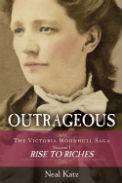
 |
Outrageous: The Victoria Woodhull Saga, Volume One: Rise to Riches
by Neal Katz
Top Reads Publishing
People are the sum of their experiences. Events pile up in a person’s life, shaping choices and chances and resulting in a jangled mix of free will and fate. Victoria Woodhull is born into suffering from a depraved father and an ensuing dire childhood of abuse, poverty, and neglect. But she forges a path out of despair with her will to reach a destiny of riches and success she believes is waiting for her to claim in the future she sees for herself.
Written with an engaging first-person narration, Woodhull comes to life with a bold voice of endurance and hope. This real-life feminist heroine of the 1800s eventually lives life on her own terms, becoming the first woman, in partnership with her sister, to own and operate a Wall Street brokerage firm and the first female to run for president. Katz’s engaging evocation of Victoria’s surprising life will remind readers of Paula McLain’s historical fiction about real-life, strong female figures like Beryl Markham in Circling the Sun and Hemingway’s wife Martha Gellhorn of Love and Ruin. Katz, like McLain, homes in on a strong woman forging her own path and tells the fictionalized story of her life with care and attention, honoring the journey of a fiercely independent woman.
Katz is careful to include the rich history of the 1850s, 60s, and 70s and populates the book with many celebrated individuals that Victoria Woodhull befriended and from whom she drew inspiration and education. Famous figures like Cornelius Vanderbilt, Walt Whitman, Elizabeth Cady Stanton, and Frederick Douglas ruminate the issues of the time such as women’s suffrage, the economy, civil rights, and the spiritualist movement. Katz effectively tells the story of Victoria Woodhull and the story of her moment in history or “herstory,” a term Katz prefers to use according to the preface of the book.
Like the subject herself, this book is bold and inspiring for its unflinching look at a woman’s transformation from helpless reliance on the men in her life to accomplished independence and mistress of her destiny. Victoria is unwavering in her determination to survive and thrive in a world that seeks to keep her shackled and powerless as a daughter, wife, and mother. Katz gives Victoria’s ambition voice in eloquent conversations with leading luminaries of the time. In one telling scene, Katz seems to give a wink and nod to the hopes of today when Victoria tells Walt Whitman she is moved by his poem “Crossing Brooklyn Ferry” and “the part about future generations looking back at me.” Whitman responds by telling her, “You are the prophecy of the future.”
The politics of today and the modern feminist movement lend an urgency to Victoria Woodhull’s story that Katz embraces as he tells this story of female empowerment. Woodhull’s intellect and willingness to learn from the people around her is important in Katz’s story, but he also emphasizes her abilities as a medium through which visions and voices arrive with warnings, predictions, and flashes of the future. This use of magical realism at times detracts from Woodhull’s true power as a woman and risks categorizing her as a witch or fraudulent fortuneteller. Too often, in fear of a woman’s power and disbelief in a woman’s intellectual superiority or gifted ambition, we label her with the supernatural and prevent others from feeling they too can become powerful—for if Victoria Woodhull is only successful because she can see the future, how can an ordinary girl be inspired?
This is a minor flaw in a book that truly celebrates a woman’s power to overcome adversity. Katz may be way ahead of the appeal of this story which might catch fire if Amazon Studios follows through on its plans to produce a movie based on Woodhull’s life which would star Brie Larson. Several media outlets in 2017 reported this news, and after reading Katz’s book, Victoria Woodhull’s story certainly should be told and shared with the masses.
RECOMMENDED by the US Review